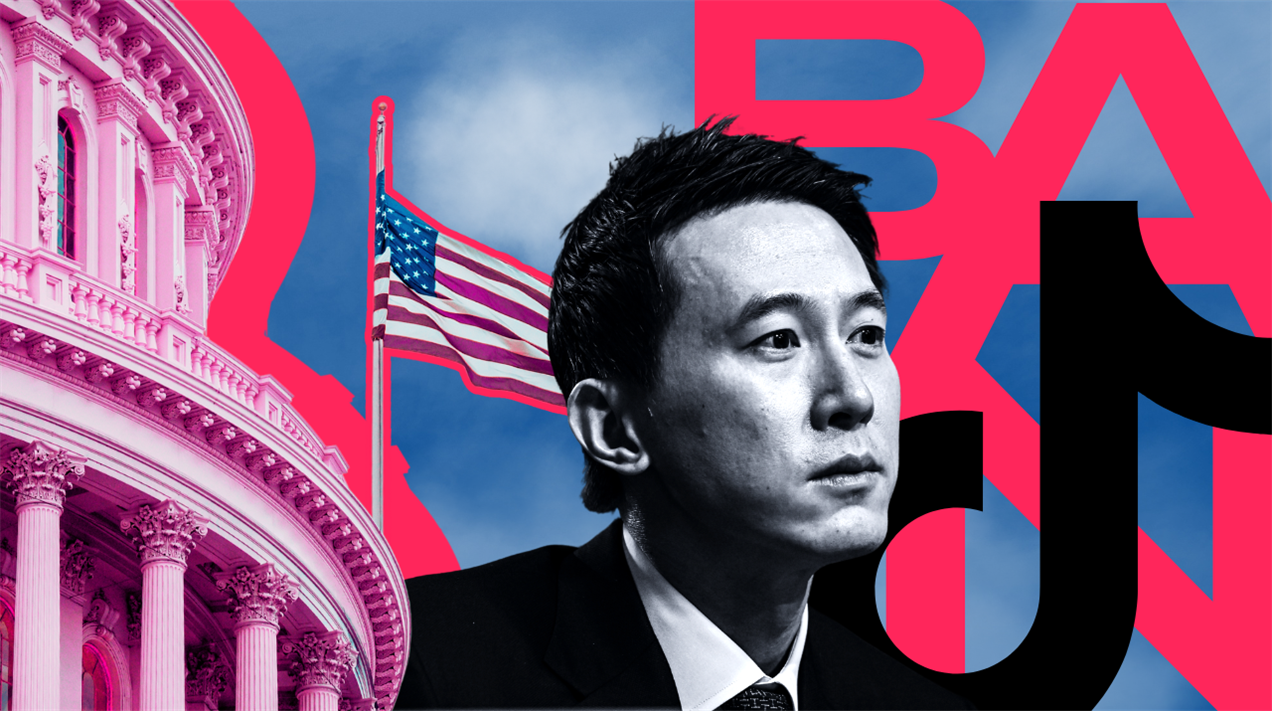‘It’s looking like it will succeed’: what would a US ban of TikTok mean for advertisers?

Amid reports of TikTok hitting $16bn in revenue from US sales, the US House of Representatives (HOR) recently approved a landmark bill that could see the platform banned in the country, passing a bipartisan vote with an overwhelming majority.
US lawmakers have been debating whether or not to ban the Chinese-owned platform for quite some time, but should this latest bill successfully pass through the senate and become law, Bytedance would have just six months to sell its controlling stake in the platform or see it banned in the US, making the threat seem far more immediate.
For marketers, TikTok’s global reach, paid social offerings and increasingly competitive search proposition has made the platform a pivotal performance marketing tool for advertisers and subsequently, it has enjoyed significant advertising investment across the social space.
But what would a US ban mean for these advertisers? To find out, PMW spoke to several experts from across the industry to assess not only the potential advertising impact of the ban for US-based organisations, but also those based in the UK, Europe and globally.
‘More power to a handful of other social media companies’
To unpack exactly what a ban would mean, Andrew Bloch, Lead Consultant of PR, Social, Content and Influencer at marketing consultancy AAR Group, said: “A ban of the app in the US would essentially mean more power to a handful of other social media companies.
“The best social media agencies are already advising and preparing their clients for the implications of such a ban, and AAR are actively working with a number of clients who are seeking agencies to provide specialist advice and consultancy surrounding the proposed legislation.”
Taz Papoulias, Head Of Media at Murmur-Group, added: “Granted the bill still has to pass the senate – but it’s looking like it will succeed. With the old adage ‘you replace one addiction with another’, the total time spent on social media won’t fluctuate as much if this occurs as users will shift their time spent on TikTok back to Meta, YouTube and the other platforms.
“[For marketers] it’s quite a complex scenario, because most advertisers in other markets only advertise in that market, but the issue lies in consumption. Globally, everyone loves to consume content produced in the USA and with 170m people on TikTok in the USA – that is a lot of content that will disappear.
“I envisage the platform will lose its stickiness and dwell time, which could drive up rates in other countries and increase impressions, similar to what happened to Meta when TikTok launched.”
Will it prompt a domino effect?
The all important question among several experts is whether or not other markets will follow suit should the ban go ahead. Shamsul Chowdhury, EVP of Paid Social at Jellyfish believes approval in the senate “would have seismic impacts on the digital media landscape”.
He said: “This ban would create a precedent for other markets, such as the UK and Europe, which would have a massive impact on ByteDance’s $225bn valuation. With over $11bn in revenue at stake for ByteDance via TikTok, they may be tempted to sell a majority stake to keep their golden egg prospering."
Daniel Molyneaux, General Manager of Claxon, mirrored much of Chowdry’s thoughts, believing that “advertisers may face uncertainty as other countries may follow suit”, mitigating their ability to generate reach via the app.
He said: “Similar discussions have already taken place here in Australia, and it’s unlikely that they will fade away anytime soon.”
Chelsea Hopkins, Social Media and PR Manager at Fasthosts, added: “The worst-case scenario here is obviously that a ban of TikTok in the US results in the UK following suit, but this would be a terrible move for a variety of industries.
“While many people will automatically think of influencers when thinking of those who use the app for work, TikTok has become so much more than that. Countless businesses large and small use TikTok for advertising, either through sponsorships or by producing their own content, with a ban effectively eliminating this form of putting your brand out there. There’s also TikTok Shop, acting as an amazing e-commerce platform for small businesses to sell their products and create new revenue streams.”
Preparing for change and adapting quickly
There’s no doubt a US ban of TikTok would leave a big hole to be filled, both when it comes to US-based users' time and organisations’ social, search and discovery advertising initiatives.
For Ed East, Global CEO and co-founder of Billion Dollar Boy however, “advertisers shouldn’t panic”.
He said: “In the worst case scenario that TikTok is banned, advertisers will likely be given some warning, enabling them to finalise most creator campaign partnerships or rearrange them – limiting the impact of a total TikTok ban as much as possible.
“Instagram reels and YouTube shorts also provide similar short-form content options that replicate TikTok’s iconic format, meaning advertisers should consider re-allocating budgets to these alternatives to prepare for a potential ban and gain valuable learnings about performance on other platforms.
“We saw this in practice in India when TikTok was banned in 2020. Creators and brands simply moved their resources to YouTube’s shorts, demonstrating the resilience of the sector.”
Cristy Ebert Garcia, CMO at impact.com, elaborated on East’s assertions further. She added: “Those who have come to use and rely on the platform are highly unlikely to see a vacuum in the market for very long. New platforms will rapidly take its place because the real appeal behind TikTok may not be the platform itself, but in the way it’s revolutionised short-form content, and the way in which creators publish and viewers consume on video-first social platforms.
“Inevitably, we’ll see users seek a new home base, whether that’s on existing platforms or a revolutionary new network.”
On the brand side, Fraser Smeaton, CEO and co-founder of MorphCostumes, said: "TikTok's possible ban reminds us that having a fundamental understanding of your customers – who they are and what they respond to – is crucial, so, in the event of a platform being banned or changing, your business isn't left with nowhere to go.
"As the vertical video phenomenon continues to dominate, it's no surprise we're seeing Amazon developing its marketplace to add vertical shoppable videos in the US, alongside Instagram reels, which has now introduced shopping.
“It really is all about staying ahead of consumer behaviour shifts and understanding trends and why they occur, which ensures a business is in a strong position when the tech landscape experiences turbulence."
‘Shining a light on the wider negative impact that the rise of big tech platforms has’
Steven Filler, UK Country Manager at ShowHeroes, said it’s good to see “more focus and scrutiny on the big platforms and the impact they have on society both in terms of the security risk to users, but also the wider impact that user-generated, unregulated content can have, especially on younger audiences”.
He said: “Raising awareness of the potential risk to consumers also has the additional benefit of shining a light on the wider negative impact that the rise of the big tech platforms has on the advertising ecosystem across the US and Europe and specifically the challenges faced by publishers who are investing resources to create valuable, informed editorial content, and rely on these advertising revenue streams to make this possible.
“The bill reinforces the importance of advertisers adopting a diverse media strategy rather than funnelling large budgets into social media, and especially volatile channels like TikTok.
“Advertisers need to be targeting multiple channels, particularly faster-growing ones like online video and connected TV (CTV), backed with proven privacy-safe solutions like contextual targeting and measurement tools encompassing attention, brand lift and green media.”
‘It (TikTok) is not the be all and end all’
Going further, Mohini Lakhani, Digital Account Director at The Kite Factory, believes “there will be very little impact of a US TikTok ban for advertisers”.
She explained: “It is one platform of many and yes, it is very popular with audiences, but it is not the be all and end all. From a UK advertiser perspective, TikTok is very much being used as a part of test-and-learn strategies and, at most, is making up 5-10% of annual media budgets, so if the app was to shut down, the most we could expect is a shift into other short-video platforms.
“And anyway, any agency worth its salt would recommend clients avoid putting all their eggs in one basket and over-rely on TikTok to meet their advertising KPIs, instead diversifying digitally where necessary.
“While TikTok has been banned on UK governmental devices since March 2023, a nationwide ban is unlikely to transpire any time soon given separate data policies and regulations to the US. And, to pre-empt any legal implications for the UK, TikTok has already actively invested £1bn in three new data centres situated across Denmark and Ireland, meaning that EU data should never make its way to China.”
An opportunity to pivot or nothing to fear?
Interestingly, not everyone believes the void left by a potential TikTok ban would immediately be filled by the likes of Meta and YouTube. Gareth Holmes, Vice President of Commercial Strategy and Media at SeenThis, thinks savvy publishers could pivot into the space.
He said: "This is not a comment or opinion on the HOR decision, the US is a sovereign nation and its leaders do as they choose with no comment from me. But with Americans 18 and over spending an average of 56 minutes a day on TikTok, the proposed ban is going to leave a multi-billion-dollar supply-hole in many media plans.
“Inversely, this creates a phenomenal opportunity for traditional publishers to pivot and adopt infrastructure which enables content plus advertising in a vertical video format, in order to provide choice for advertisers going forward.
“If websites with cross-generational audiences act quickly and present their new offerings to agencies and brands while they digest this news, and contemplate how to re-assign these vertical video budgets, there is a very grand prize up for grabs.”
‘TikTok will not be banned in the US’
While some experts think organisations should be preparing alternatives, or thinking about moving into the space, not everyone is convinced that TikTok will actually be banned in the US, believing ByteDance would sell the platform if it had to.
Maor Sadra, CEO of INCRMNTAL, said: "To my 13 year old daughter, and every advertiser out there: TikTok will not be ‘banned’ in the US. ByteDance will be forced to sell the asset and hand over control to an American company.
"While TikTok is a privately held company, the current estimated value of TikTok is well above $250bn. TikTok has been and still is the fastest growing social platform in history, passing Instagram and Facebook in user attention. You can’t find a person under 25 that isn’t on TikTok and this lucrative Gen Z audience has a significantly reduced presence on Facebook. While TikTok's main competitor, Instagram Reels, just isn't as good and doesn’t feature the same social phenomena to compete with TikTok.
"Given the value and potential of a US owned TikTok, several consortiums of investors are grouping in a bid to acquire TikTok. With Meta's market cap over 1 trillion dollars, most investors agree that TikTok is currently undervalued.
"Even if the CCP is in full control of TikTok, the financial interest here is too large for anyone to be pushing an agenda in the face of value creation. Same goes for advertisers who can’t ignore the fact that their audience is on TikTok."
Also published in: Performance Marketing World



